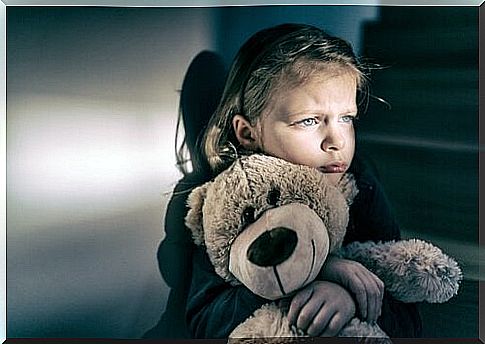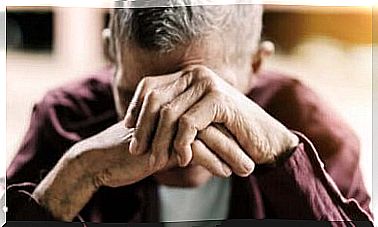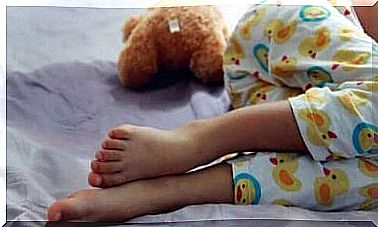How Parents Affect Their Children’s Mental Health

Sometimes family environments are not just painful to live in; in fact, parents may be affected by their children’s mental health. Some parents put their children in stressful situations, where the children feel humiliated, anxious and helpless. This kind of experience is difficult and follows us into adulthood.
Oscar Wilde pointed out that almost no one knows what is happening behind the home’s lantern doors. That environment can be like a bed for various horrors. Moms, dads and other family members can create invisible dramas that pass unnoticed in the rest of society.
This also has significant effects on children. Dr. Anne-Marie Conn at the University of Rochester Medical Center has studied the phenomenon. She found that the consequences of a dysfunctional upbringing and the psychological damage that follows from this can be passed on to the next generation.
This means that trauma that occurs due to lack of connection, abuse, physical or mental violence or anything else that interferes with the child’s psycho-emotional development, can have major repercussions. Trauma affects mental health and can alter brain development. This can lead to psychological disorders, which can later affect the victims’ way of raising their own children.

Parents can affect their children’s mental health. A safe family environment that promotes a positive emotional development and a strong self-esteem has lasting repercussions. This type of upbringing gives children the opportunity to reach adulthood with good psychological skills. However, a tumultuous and traumatic upbringing can have serious consequences for the child’s psychological health.
In addition, we know today that the main cause of children’s emotional and behavioral problems is to be found in the dynamics and circumstances within the family. Not so long ago, the Journal of Family Psychology actually published a study claiming that even a slap on the butt can have negative consequences.
Gestures, words or behaviors that are aggressive in a direct or indirect way will leave their mark. They will change the child’s behavior and leave an impression attached to the child’s brain. So when children grow up in this kind of environment or with certain harmful parenting strategies (discipline, aggressive communication or authoritarian upbringing), they often exhibit a certain type of behavior and characteristics:
- They have low self-esteem.
- They assume that their own needs are unimportant.
- They think that the expression of emotions is negative and inappropriate.
- They see this family dynamic (aggression, abuse or disrespect) as normal and permissible.

When you grow up in such circumstances, each experience leaves its own special scar. Of course, it is true that some people manage to recover after a difficult childhood and live healthy and anxiety-free lives. But most are more vulnerable and these experiences have significant effects on their mental health. Let’s take a closer look at this.
One of the most common ways in which childhood trauma manifests itself in adults is in the form of chronic stress.
State of permanent stress
When children live in unstable environments, they are exposed to stress. If you grow up unrelated to a primary care provider and feel insecure and unloved, this gives rise to significant anxiety. This type of stress is initially acute. But if it is allowed to continue for a long time, it can become permanent.
Chronic stress can also change the way the brain works. It can affect the ability to concentrate and memory. The result is often hyperactivity and lack of emotional control.
Co-dependent relationships
When you grow up in a cold and loveless home, you are easily starved of intense emotional relationships. You want to feel confirmation and security. But an incessant worry of losing these relationships can lead to compulsive behavior. Anxiety makes it easy to end up in a co-dependent relationship.
Parents affect their children’s mental health in many different ways. We should all be aware that the upbringing of our children has a major impact on their lives and future development. We must all be aware of this and set a good example in our behavior and our way of communicating.
Permanent anxiety and helplessness
When you grow up in a family that cannot convey safety and security, this has consequences. If you do not have an enriching environment that helps you develop your personal identity, you risk growing up with serious psychological deficiencies. It can manifest itself in hopelessness and low self-esteem. This puts you at greater risk of developing chronic pessimism and anxiety.
Learned helplessness is another common psychological reality. This means that a person assumes that she can not change her situation no matter what she does. She assumes that she is powerless over her life.
Psychological mechanisms that “hide” a traumatic past
The mind often does not have the strength to deal with the stress that trauma causes, so it uses certain psychological mechanisms to cope with daily life without being bothered by the trauma. This helps people to function for a while. The consequence, however, is that they develop psychological disorders.
The most common of these are dissociative disorders, which affect the personal identity, memory and perception of the environment. It is a fairly common effect of post-traumatic stress. Dissociative disorders are rooted in trauma.

In summary, we can state that parents affect their children’s mental health in many different ways. Getting out of these black holes requires more than just time. You need plenty of courage and plenty of support. By seeking qualified help, you can learn to take control of your life. Even if you have a traumatic past, you can create a healthy, dignified and fulfilling life for yourself.









